TR Review: Seth MacFarlane’s Comedy Western Is an Unexpectedly Personal Statement
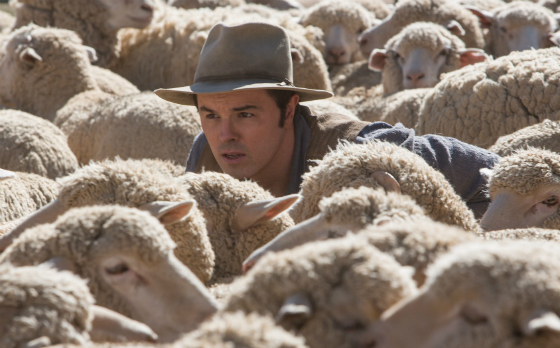 |
I don’t normally talk about moments that happen late in a movie’s run time, but it isn’t particularly a spoiler to say that there is a point not too long before the climax of A Million Ways to Die in the West at which Seth MacFarlane’s sheep-farmer Albert, once more facing certain death for the umpteenth time, offers up a testimony he hopes will save his life, in which he declares himself a “nerd asshole,” rejected by other assholes so he instead buried himself in books, learning math and languages.
It’s true of Albert, who stays nerdy throughout and does not become some Karate Kid-like hero at the end by learning how to fight like a man, but it’s also true of MacFarlane as well – this is, I think, the first time I’ve seen him basically admit that his reference-heavy, detached humor is a defense mechanism evolved from growing up weak among manly men, and it’s actually a pretty stirring nerd credo.
In an odd way, this comedy western feels like the most personal creative work he’s ever done. And whether you like the guy’s stuff or not – I’m somewhere in the middle, happy to mock his excessive use of referential humor and “ironic” racism while still mostly enjoying his cartoons – isn’t this what we want? Isn’t this why we’re unhappy Edgar Wright isn’t making Ant-Man? If you support directors making the passion projects they want to make, A Million Ways deserves your respect, if not your love.
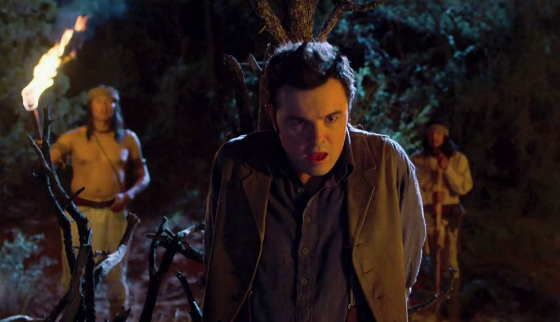 |
Aside from incongruous modern slang like “Oh no I di’int!” there are maybe five references to modern pop-culture at most – one of which has been spoiled in some TV spots and is on a par with the Sam J. Jones cameos in Ted. And hey, maybe there shouldn’t be any, but you can’t expect the guy to go from a bazillion to zero right away (the “Mila Kunis” bit overplayed in the trailer is better edited in the final product). Most of the humor is situational, based on the fact that a guy like Seth MacFarlane would have a horrible time in the Old West, as would most of us. He’s no Mel Brooks, nor is he on the level of Monty Python, but his juxtaposition of pragmatic modern attitudes into movie fantasyscapes recall the former, and his lingering on the grime and death of history as a source of comedy bring to mind the latter. Better yet, he doesn’t feel the need to have anybody go “You tink daaaat’s bad? Remembah da time I had a BLAZING SADDLE?” The influences remain influences, not exposition. Though to read other reviews, some of which seem to have been written before even viewing the movie, you’d think otherwise.
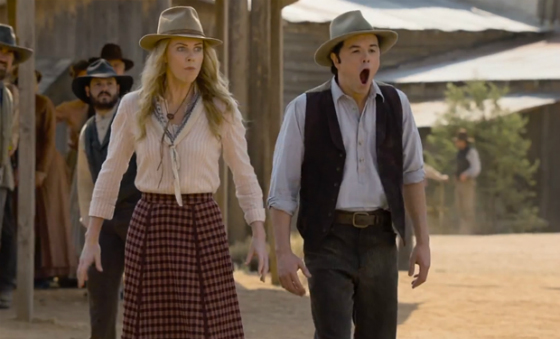 |
MacFarlane’s acting has always been a big question mark, and indeed, for much of the first half of the movie, it mostly consists of staring at stuff while his mouth hangs open, giving the audience ample chances to notice his weirdly asymmetrical eyes. But when you get to the nerd asshole monologue, as well as several other defensive, self-effacing moments, you might think to yourself: could someone like Paul Rudd have pulled those off and had us believe them to the same extent? This is MacFarlane as he sees himself – a guy beset by hordes of threatening people more talented than he is, surviving by mockery and sneaky tricks. Other actors could have brought better thespian skills to the table, but only MacFarlane could have played this character.
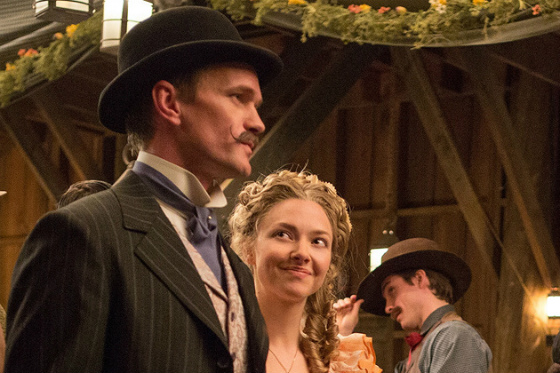 |
And he surrounds himself with talent. While I’m a bit sick of Neil Patrick Harris being cast as misogynist womanizers purely because he’s really gay and that’s the joke, his mustache-wax salesman here is a hoot, and undoubtedly a comment on the similarly annoying hipster facial hair trends of today. Christopher Hagen is a revelation as Albert’s American Gothic-like dad (sample dialogue with MacFarlane: “You’re late!” “For what?” “Fair point.”). Liam Neeson plays his Northern Irish accent more broadly than I’ve heard in ages, rendering him nigh-incomprehensible, but gamely plays it straight. Charlize Theron proves she needs to be in more lead roles, effectively forcing MacFarlane to raise his game in their many scenes together, while Amanda Seyfried seems to have been cast purely so that MacFarlane coudl write jokes about how big her eyes are.
There are, as usual, a TON of cameos – I won’t spoil the actor playing Abraham Lincoln, but the casting alone is brilliant. The only guy a bit out of his depth is Evan Jones as Clinch’s right-hand man – he’s generic and forgettable in a movie where every performance counts.
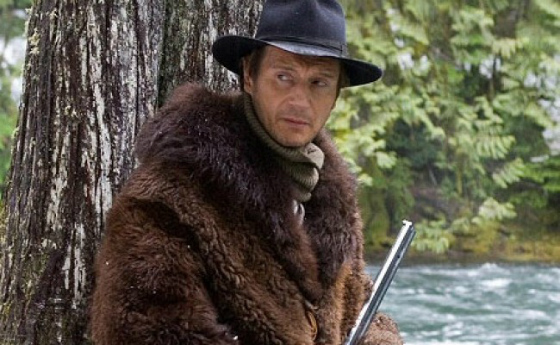 |
MacFarlane may be showing some more storytelling skill than usual, but he could still stand to learn a thing or two more – as with Ted, the movie feels like it has four acts, with an additional showdown with a villain tacked on after the hero’s major arc has been effectively completed. Neeson’s evil Clinch appears briefly at the beginning of the film and is mostly irrelevant until the end; throughout the bulk of the film, Neil Patrick Harris’ mustache-o-phile Foy, who has no connection whatsoever to Clinch, is the primary antagonist. There’s also some really awkward action directing: a horse chase sequence involving a train tries in vain to use editing tricks that don’t disguise its terrible sense of screen geography.
So let’s say you’re a long-time MacFarlane fan and you’ve read this far. I assume you’re wondering if your idol has sold out completely. Well, fear not: this film probably holds the world record for number of giant sheep penises shown onscreen, there’s an extended laxative joke, and yes, there are bits that comment on racism, though not as many as you’d expect, and at least this time most of it is directly rebuked. Also, every other word is “fuck.”
A Million Ways to Die in the West isn’t going to change film history or even become any kind of classic, but it is a solid R-rated laugher, and it goes a long way towards making the case that Seth MacFarlane is in fact one of us. Yes, he overdoes it with lame references sometimes…okay, a lot…but for Bison it was Tuesday. Whose responsible this?
